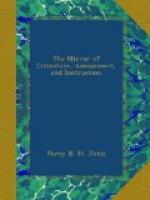Guy Mannering.—The origin of Meg Merrilies, and of one or two other personages of the same cast of character, will be found in a review of the Tales of my Landlord in the Quarterly Review of January, 1817.
Legend of Montrose.—The tragic and savage circumstances which are represented as preceding the birth of Allan Mac Aulay, in the “Legend of Montrose,” really happened in the family of Stewart of Ardvoirloch. The wager about the candlesticks, whose place was supplied by Highland torch-bearers, was laid and won by one of the Mac Donalds of Keppoch.
* * * * *
I may, however, before dismissing the subject, allude to the various localities which have been affixed to some of the, scenery introduced into these novels, by which, for example, Wolf’s-Hope is identified with Fast Castle, in Berwickshire; Tillietudlem with Draphane, in Clydesdale; and the valley in the “Monastery,” called Glendearg, with the dale of the Allan, above Lord Somerville’s villa, near Melrose. I can only say, that, in these and other instances, I had no purpose of describing any particular local spot; and the resemblance must therefore be of that general kind which necessarily exists betwixt scenes of the same character. The iron-bound coast of Scotland affords upon its headlands and promontories fifty such castles as Wolf’s-Hope; every country has a valley more or less resembling Glendearg; and if castles like Tillietudlem. or mansions like the Baron of Bradwardine’s, are now less frequently to be met with, it is owing to the rage of indiscriminate destruction, which has removed or ruined so many monuments of antiquity, when they were not protected by their inaccessible situation.—The scraps of poetry which have been in most cases tacked to the beginning of chapters in these novels, are sometimes quoted either from reading or from memory, but, in the general case, are pure invention. I found it too troublesome to turn to the collection of the British poets to discover apposite mottos, and, in the situation of the theatrical mechanist, who, when the white paper which represented his shower of snow was exhausted, continued the storm by snowing brown, I drew on my memory as long as I could, and when that failed, eked it out with invention. I believe that, in some cases, where actual names are affixed to the supposed quotations, it would be to little purpose to seek them in the works, of the authors referred to.—And now the reader may expect me, while in the confessional, to explain the motives why I have so long persisted in disclaiming the works of which I am now writing. To this it would be difficult to give any other reply, save that of Corporal Nym—It was the humour or caprice of the time.




